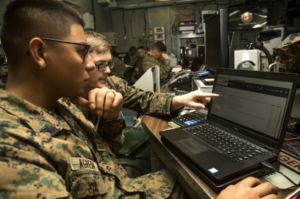
DoD Intel Agency Upgrades Databases

Source: DIA
U.S. intelligence agencies are lining up to upgrade antiquated IT infrastructure and bulging databases after decades of largely failed attempts by the military services to deploy “all-source analysis” platforms.
The CIA and other spy agencies have moved aggressively in recent years to migrate troves of data to the cloud where an array of tools can be used by intelligence analysts to connect the dots. Those modernization efforts are expanding to other intelligence agencies as they seek to get a handle on sensor and other unstructured data.
Among them is the U.S. Defense Intelligence Agency (DIA), which recently awarded a $690 million “task order” contract to Northrop Grumman Corp. to deliver a big data platform. (Task orders, sometimes referred to as “mini-contracts,” differ from standard procurement deals in that they specify precisely how funds are spent and provide a delivery schedule that conforms to a master contract.)
The company (NYSE: NOC) said this week it will supply the data platform under DIA’s TALOS program, which stands for Transforming All-Source Analysis with Location-Based Object Services.
The TALOS system would incorporate a next-generation database dubbed Machine-Assisted Rapid-Repository System, or MARS. The system is billed as “transforming current databases housing foundational military intelligence into multi-dimensional, flexible and rigorous data environments….”
“With data proliferating at the speed of light, DIA must build a system capable of ingesting and managing large volumes of it, and making it available to both humans and machines,” the agency said.
Under the TALOS task order, Northrop Grumman said it would serve as “enterprise module integrator” for MARS. That task includes implementing AI and machine learning tools that will be used to ingest and manage large volumes of intelligence data. The system would allow intelligence analysts to leverage predictive analytics to aid military commanders in the field.
“For analysts and planners, it means being able to leverage a virtual model of the real world that’s so thorough it cuts across all domains, significantly increasing the warfighter’s ability to mitigate risks and defeat adversaries,” DIA said.
The TALOS task order was awarded competitively in August, the company said.
The DIA data effort is the latest in a steady stream of U.S. military efforts aimed at upgrading databases bulging with intelligence and logistics data that remain difficult to access and quickly analyze. The Air Force, for example, is embracing commercial machine learning platforms to streamline its flight certification process as well as for predictive aircraft maintenance.
Recent items:
Tamr Helps Air Force Wrangle Data
Why AI Is a Critical Capability for the US Space Force
Air Force Expands Predictive Maintenance



























